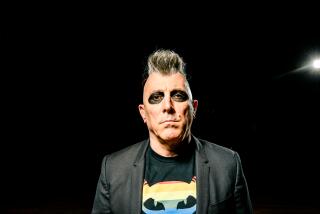OINGO BOINGO’S ELFMAN TRIES A ‘SO-LO’ ALBUM
- Share via
With his wild eyes outlined in black and a diabolical grin plastered on his face, Danny Elfman rarely strikes anyone as remotely mellow. The adjective more often used to describe Oingo Boingo’s wound-up, irreverent leader is possessed.
However, winding down at the home he shares with his wife and children not far from Malibu, Elfman seemed overtaken by nothing more malevolent than the joy of having his first MCA solo album hit the racks.
“Its general tone is much more laid-back than an Oingo Boingo album,” said the redheaded singer and songwriter, taking shelter from a rainy afternoon in a home studio cluttered with African and Balinese percussion instruments.
“I knew a lot of Oingo Boingo fans wouldn’t like the album because of that. But it was fun to do some ballads and try to snap out of that image that a lot of people have of me just writing real fast, fast, fast, fast tunes.”
Of course, what’s slow to Elfman might not count as a ballad in anyone else’s book. The bulk of the new LP, pragmatically titled “So-lo,” may strike the average ear as only slightly less nervous than the uppity material he pens for his band (which will mix group and solo work on stage Friday night at the Universal Amphitheatre).
“So-lo” is clearly not the typical case of an ensemble-bound performer struck by cabin fever and blowing off a little steam on his own. Elfman handled much of the instrumentation through synthesizer programming, but when it came time to employ actual musicians to play on the sessions, he enlisted the current lineup of Oingo Boingo in its entirety. Likewise, he says, he’s sharing his royalty points from the album with the band.
“This album was not made out of frustration,” emphasized Elman, 29. “It’s not the same as a lot of other solo projects versus group projects. I know there’ve been a lot of rumors about Oingo Boingo breaking up and me pursuing a solo career, but I have no solo career. If anything, I feel more committed now to the group than I ever have.”
Elfman is even considering alternating group albums with solo efforts. The reasons: It will provide him with an outlet for material that may not fit into Oingo Boingo’s frantic format and enable him to release two albums a year in an industry that’s tied to the concept of “everything works in year cycles.”
After starting in tiny clubs in the late ‘70s as an avant-garde musical/theatrical troupe called the Mystic Knights of the Oingo Boingo, Elfman’s band grew into one of the city’s most popular new-wave music acts in the early ‘80s, filling medium-sized halls here with wildly enthusiastic, mostly young audiences.
Away from the West Coast, it’s a different story. Oingo Boingo can currently be seen pitching Budweiser in a colorful TV spot, but an even more appropriate vehicle might be one of those American Express ads in which celebrities bemoan their lack of recognizability outside their own turf. Elfman is a star in Los Angeles but an unknown quantity most everywhere else.
“Out here we draw as many people as many major acts that have sold 10 times as many records,” Elfman said. “We’re always flabbergasted ourselves at how we can sell out places like the Pacific Amphitheatre.
“That just fuels us so much every time we do a concert anywhere in this region of the world--we’re treated like an underdog hometown team that the audience wants to succeed because they discovered us and they made us. The TV didn’t make us. Our image didn’t make us. And the press didn’t make us. There was no big ‘because we were the latest thing out of England’ hype that made us.
“Even if we never get any farther than we have right now, ultimately it’s more meaningful for us to know that we (achieved) the success with everything stacked against us--with the press saying ‘this is awful’ and everything. It’s always been our goal to make it step by step and never to be the fashionable thing.
“We try very much to have everything about us be totally un-rock ‘n’ roll. Because to us, that’s the ultimate hypocrisy out there: the rock ‘n’ roll myth of having to look and act a certain way and pretend to have this connection with the streets.”
More to Read
The biggest entertainment stories
Get our big stories about Hollywood, film, television, music, arts, culture and more right in your inbox as soon as they publish.
You may occasionally receive promotional content from the Los Angeles Times.









